Briefing MONTHLY #62 | May 2023
Summit watch | Thai people power | Budgeting for Asia | India’s boss | Deciphering China | Driving Indonesia | Vietnamese gold
Animation by Rocco Fazzari.
BATON CHANGES
Thais have been electing national assembly representatives since 1933 amid serial coups, but the Timorese have done so only since 2001 after centuries of colonialism.
So, as regional summits have again drawn attention to ominous big power rivalry this month, the peaceful changes of government in two of the region’s oldest and newest sovereign states deserves celebrating amid varied other democratic setbacks in their near neighbours such as Cambodia.
Thailand’s victorious Move Forward Party and its new coalition partners still have some way to go working through an electoral system designed to make such power shifts difficult. Meanwhile, after a return to power in Timor Leste, ageing independence leader Xanana Gusmao faces challenges delivering better health and education for his youthful population instead of fighting old battles from the past.
And amid these latest demonstrations of popular suffrage in Asia, in NEIGHBOURHOOD WATCH we also look forward to the future poll battles in three other tumultuous regional democracies: India, Indonesia, and the Philippines.
Meanwhile, the region has just been through a warm-up for the usual late year summit season with the sequential occurrence in the neighbourhood of peak meetings for the Association of Southeast Asian Nations (ASEAN), the Group of Seven (G7), and the Quadrilateral Security Dialogue (Quad), although not in Sydney as planned.
China’s rise was the key public and private issue throughout these summits which broadly embraced de-risking rather than de-coupling as the right path ahead. (See DECIPHERING CHINA below).
But the gatherings also epitomised the growing rivalry between proliferating regional institutions spurred on by the decoupling debate. It’s a persistent theme through this edition. And it must be quite daunting for Gusmao as tiny Timor takes its first steps into this regional maze of diplomatic bodies with a new roadmap for joining ASEAN.
Greg Earl
Briefing MONTHLY editor
NEIGHBOURHOOD WATCH
THAILAND: After Thaksin
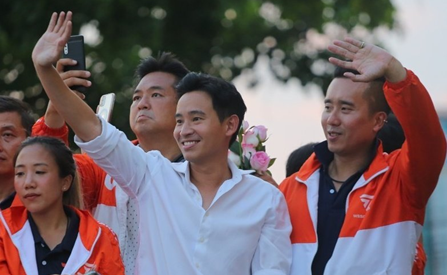
Looking forward … Pita Limjaroenrat (center)
Thailand’s upstart millennial political party Move Forward is already under pressure from both its left and right flanks as its leader Pita Limjaroenrat tries to cling on to the country’s future prime ministership without too much compromise.
At the time of writing Pita was gambling on winning enough votes from the country’s 250 member Senate to hold on to the top job rather than seeking support in the lower house from parties that were in the old military led government.
But he is facing criticism from his party base for backing away from laws preventing criticism of the country’s king as part of his agreement to build a winning coalition in the lower house with an unusually comprehensive political and economic reform plan. At the same time, he is coming under pressure from the more established fellow opposition party Pheu Thai for not sharing enough power with it by, for example, giving it the Parliament Speakers job and more ministries.
Move Forward won an unexpectedly strong mandate to lead a new government at the May 14 election overtaking Pheu Thai, the party associated with exiled former prime minister Thaksin Shinawatra which was favoured by opinion polls to win the most seats.
Pita, 42, has assembled a potentially fractious eight party coalition with 313 seats in the 500 seat lower house to support a reformist government. But he is still 63 votes short of winning the prime ministership because that position is decided by a joint sitting with the 250 seat Senate. He could raise those votes from combining with the centrist Bhumjaithai Party, but it was part of the old government.
The putative prime minister, and US-educated entrepreneur, is instead gambling that enough of the military government appointed senators will eventually support him in recognition that he has now built a party which moved beyond the youth vote it won at its first election in 2019. It has instead built a solid middle-class constituency by winning virtually all the seats in Bangkok.
The prime ministerial strategy could still fail. But after nearly two decades of coups, street violence and party manipulation by government agencies, Move Forward has the potential to cut through the long running yellow shirt (establishment/military) versus red shirt (Thaksin supporters) divide which has undermined Thailand’s economic growth and regional diplomatic clout.
Briefing MONTHLY on the rise of Move Forward:
February 2019: “Look out for a Thai version of France’s Emmanuel Macron with millennial tycoon Thanathorn Juangroongruangkit’s Future Forward doing remarkably well in the poll.”
April 2023: “Its Move Forward successor seems to have the same momentum at this election because it is seen as less compromised than other more centrist or opposition parties.”
- Tan Hui Yee, in The Straits Times, explains why Thailand’s middle class is shifting from the old military/monarchist order.
TIMOR LESTE: Hero's return
The Australian government will be under increased pressure to facilitate processing of gas from the Timor Sea onshore in Timor Leste after Xanana Gusmao's substantial victory in the country’s sixth general election.
Gusmao’s National Congress for Timorese Reconstruction (CNRT) won 42 per cent of the vote and 31 seats in the 65-seat legislature and is likely to form a government with the Democratic Party which won six seats.
His return to the prime ministership after an eight-year break underlines the continued power of ageing independence struggle figures in the country’s politics and follows the election of Jose Ramos Horta as president last year.
Gusmao, 76, was previously either president or prime minister in the country’s first decade of independence. But the defeat of the Fretilin-led outgoing coalition government may signal the beginning of a new political generation. There have been calls for former national leaders and Fretilin powerbrokers Mari Alkatiri and Francisco Guterres to stand down after the party’s worst result.
But while many analysts say younger Timorese are more focussed on better health and education and economic diversification, Gusmao has made onshore processing of gas from the Greater Sunrise gas fields a key part of his political legacy. He has argued that Australia should support this partly in reparation for past exploitation of Timor’s resources.
- At Inside Story, Michael Leach says the new prime minister faces a difficult decision over how much of the country’s US$17 billion oil sovereign wealth fund to spend on a local gas processing plant.
INDIA: Congress wakes
A year ago, India’s once dominant Congress Party seemed headed for political oblivion, only holding power in two states just like the relatively new upstart opposition Aam Aadmi Party.
But after a series of bad electoral performances at the state and national level, an unexpected winning result in Karnataka state against Prime Minister Narendra Modi’s Bharatiya Janata Party (BJP) election has possibly made next year’s national election more competitive.
Modi is a long way from losing the national election with Congress and partner parties only holding seven of India's 36 states compared with 15 for the BJP and allies. But the result in Karnataka (which includes the Bengalaru technology centre) has done two things.
Firstly, it has underlined that while Modi may be India’s strongest leader for decades, especially abroad like on his recent visit to Sydney (See MODI ROCKS IN below), the BJP narrowly draws its power from India’s populous and more Hindu north. It holds no southern states after losing Karnataka.
Secondly, reaction to the Karnataka result from other opposition parties suggests they see Congress the leader of any anti-BJP coalition at the national election whereas a year ago that was less clear. That partly reflects apparent renewed public enthusiasm for Nehru-Gandhi family scion Rahul Gandhi as the opposition leader.
- The Times of India has ten takeaways from the Karnataka poll for next year’s national election.
INDONESIA: Deputy dealmaking
Indonesia is potentially facing its first three candidate race for the country’s presidency next February with the prospect of a run-off election between the two top candidates.
The candidates – former military officer turned serial presidential aspirant Prabowo Subianto; former Jakarta governor Anies Basweden; and current Central Java governor Ganjar Pranowo – are not commanding consistent clear leads in the opinion polls, although Anies is declining.
That could make the choice of vice-presidential running mates more important than ever in pulling in key sectors of the population or supporters of other political parties in a competitive three-way first round of voting. Much will depend on President Joko Widodo’s apparent efforts to force an accommodation between Ganjar and Prabowo, although there have been increasingly mixed signals on that.
Although it is five months until running mates must be settled, rumours have been flying about possible combinations. For example, amongst the varying powerplays, Prabowo has reportedly considered the head of the Soeharto era Golkar Party and current industry minister Airlangga Hartarto. Ganjar is said to have been considering repeating Widodo’s 2019 approach and choosing someone from the nation’s largest moderate Muslim group Nahdlatul Ulema. Anies has been linked to Agus Harimurti Yudhoyono, son and head of the Democrat Party founded by former president Susilo Bambang Yudhoyono.
But surveys show that emerging younger political operatives such as tourism minister Sandiago Uno and West Java governor Ridwan Kamil are seen as potential running mates for all the presidential candidates.
- This piece from The Straits Times looks at the looming vice-presidential race. And see DRIVING INDONESIA
PHILIPPINES: Dynastic divide
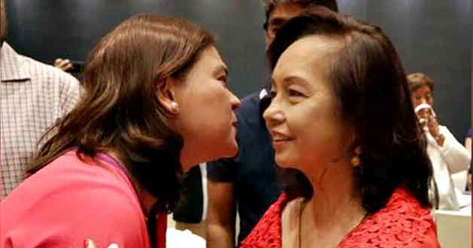
Power couple … Sara Duterte (left) and Gloria Macapagal-Arroyo
It is still five years until Philippines President Ferdinand Marcos junior must leave office after making an unexpectedly smooth transition to power as the son of a former dictator. But it only underlines the deep family foundations of Filipino politics that this month the contours of the next election may have emerged and potentially disrupted Marcos’ reins of power.
Vice president Sara Duterte, Marcos’ election running mate and daughter of former president Rodrigo Duterte, has left the president’s ruling party in the national legislature in a de facto alliance with former president and House speaker Gloria Macapagal-Arroyo.
Marcos says the Duterte split reflects her big workload as Education Secretary and head of a new taskforce to end the country’s communist insurrection. But Duterte and Arroyo are widely reported to be involved in a powerplay to unseat Marcos’ cousin Martin Romualdez as current House Speaker to undermine his stature as a replacement for Marcos in 2028 when Duterte will likely run as president with Arroyo’s support.
- At Rappler, Bea Culpin says Duterte and Arroyo have a little understood history of cooperation that is now at the heart of Filipino politics.
FROM THE SUMMITS
Quad: After the full summit was cancelled in Sydney, the four Quadrilateral Security Dialogue leaders from the US, Japan, India and Australia managed to tick off their business in less than an hour before attending the G7 leaders dinner on May 20. The key points from their 3000 word statement:
- A Partnership for Cable Connectivity and Resilience will strengthen telecommunications cables across the region.
- A Quad Investors Network will facilitate investments in strategic technologies, including clean energy, semiconductors, critical minerals, and quantum. Former Treasurer Joe Hockey, former Telstra chief executive Andy Penn, fund manager Ashok Jacob, former Liberal politician Arthur Sinodinos, and Australian Strategic Policy Institute director Bec Shrimpton, will be the Australian members.
- An Infrastructure Fellowships Program will assist 1800 professionals to manage quality infrastructure in their countries.
- The pandemic vaccine partnership will be turned into a broader Quad Health Security Partnership to support health security including support for health workforce development, disease surveillance, and electronic health information systems and coordination of outbreak responses.
- Careful attention to working in alignment with pre-existing regional groups such as ASEAN.
ASEAN: The ten-member group held the first of its two annual summits in Labuan Bajo in eastern Indonesia on May 11. The key points from the 10,000 word statement and other documents:
- Indonesia was backed to engage all stakeholders in Myanmar to work towards implementing the ASEAN five-point consensus to ease the conflict.
- More work to protect migrant workers and victims of human trafficking.
- A roadmap was agreed to achieve Timor-Leste full membership.
- Joint efforts to develop a regional electric vehicle ecosystem.
- Increased use of local currencies in cross-border trade and investment to enhance financial resilience.
- No acknowledgement of how new groups such as the Quad are testing ASEAN’s role in regional architecture.
Group of Seven: The G7 meeting on May 20 underlined the group’s renaissance amid growing global divisions with Japan inviting an unusually large contingent of Asian regional leaders from Australia, India, Indonesia, Vietnam, South Korea and the Cooks Islands (Pacific Islands Forum chair), amongst others. The 20,000 word statement ranged across global issues as the G7 sought to take up of the aspirations of the larger but younger Group of 20. But some key points relating more to Asia were:
- An emphasis on de-risking rather than de-coupling in fostering economic resilience and security. The statement said: “Our policy approaches are not designed to harm China, nor do we seek to thwart China’s economic progress and development. A growing China that plays by international rules would be of global interest. We are not decoupling or turning inwards … With a view to enabling sustainable economic relations with China, and strengthening the international trading system, we will push for a level playing field for our workers and companies. We will seek to address the challenges posed by China’s non-market policies and practices, which distort the global economy.”
- Support for a free and open Indo-Pacific and opposition to unilateral attempts use force or coercion.
- A special effort to elevate support African countries in international fora.
- Support for the private sector, universities and thinktanks in realising a free and open Indo-Pacific.
- Re-endorsement of pathfinder Just Energy Transition Programs in Indonesia and Vietnam, and possibly India.
- Support for Japan/India/France meeting on Sri Lankan debt as a model for other debt troubled middle-income countries.
- Support for ASEAN’s approach to Myanmar.
ASIAN NATION
MODI ROCKS IN
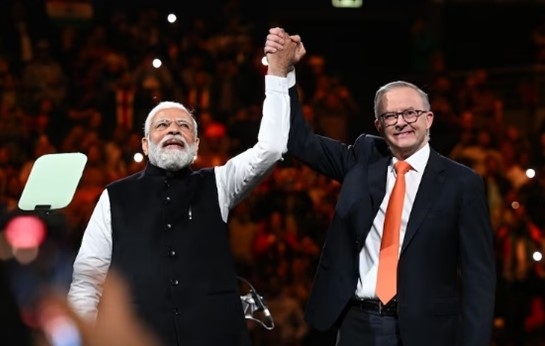
Prime Ministers Narendra Modi and Anthony Albanese at Sydney Olympic Park.
When then Prime Minister Scott Morrison shared a platform with then President Donald Trump in the run up to the last US presidential election there were many rumblings about taking sides in foreign politics from the Labor Party.
But the same rules didn’t apply when Indian Prime Minister Narendra Modi received another rockstar welcome from the Indian diaspora in Sydney during his tour of Japan, Papua New Guinea and Australia. Little separated the various Australian politicians attending the event all conscious of the rising long term electoral clout of Australia’s fast-growing population of Indian origin.
While Prime Minister Anthony Albanese dubbed Modi “the Boss” for filling a stadium like Bruce Springsteen, Modi’s campaign team for next year’s Indian election would have more likely been playing up Modi’s ability to set the agenda offshore as well as at home.
In the key outcomes from the visit:
- The Australia-India Migration and Mobility Partnership Arrangement to promote two-way mobility of students, graduates, academic researchers and business people was finalised. It will make it easier for Indian graduates to work in Australia.
- The new Centre for Australia-India Relations will be based in Parramatta acknowledging western Sydney’s Indian communities and its Board members were announced.
- Australia’s Consulate-General in Bengaluru, announced by the last government, will open this month and Indian will open a consulate-general in Brisbane.
- The two leaders reaffirmed a desire to complete a comprehensive economic and investment agreement by the end of the year.
- The terms of reference for an Australia-India green hydrogen taskforce were announced.
BUDGETING FOR ASIA
In the past two months both the Defence Strategic Review and then the Federal Treasury have endorsed better coordination between the defence, diplomatic and development aid arms of international relations policy (the so-called three Ds) with increased finding for diplomacy. The second Albanese government Budget took some interesting steps down this path amid doleful old realities.
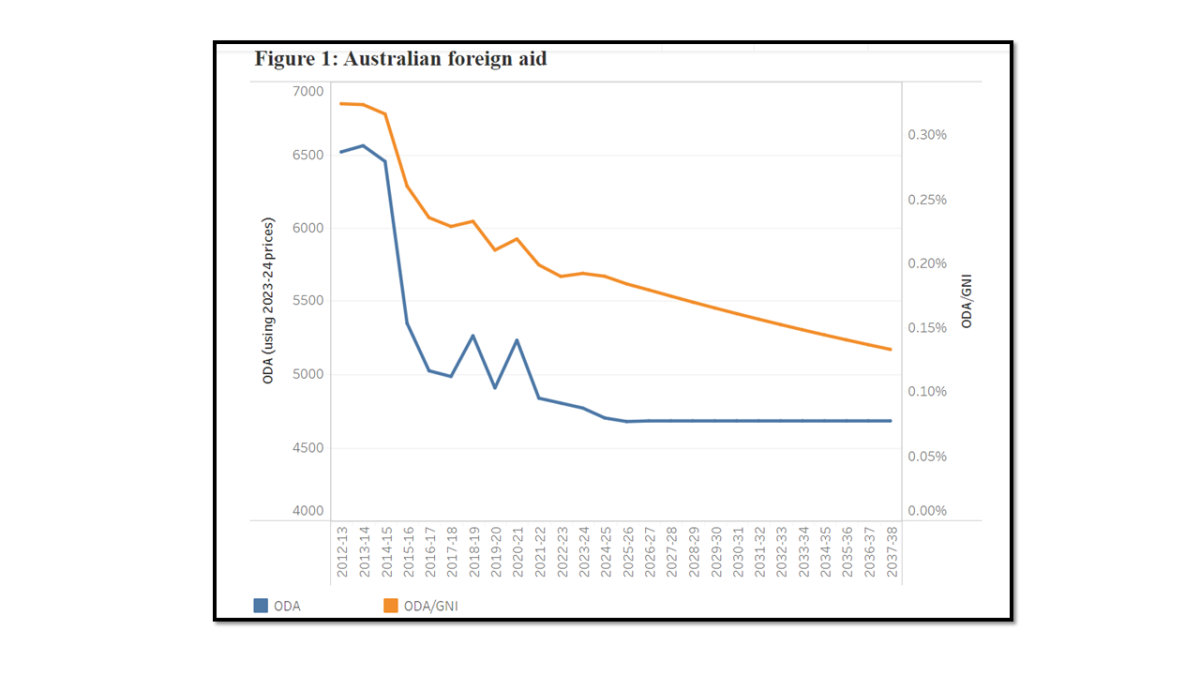
Source: Development Policy Centre
Aid: The government has put a long-term floor under the aid budget, after initial large cuts under the previous Coalition governments, by committing to increasing it by 2.5 per cent a year. But this does not come into effect until after the current Budget four year forward estimates in 2027-28. In the meantime, the latest Budget increased aid spending by $159 million over four years along with $37 million for DFAT over the same period to better manage the aid program.
The new increased four-year spending is less than the increased aid spending in last year’s initial Labor Budget and the previous pandemic period Coalition Budgets, although they both included special circumstances. The long-term commitment provides a base for aid spending level ahead of the release of a broad aid review later this year. But in the long term it represents a continued decline in Australian aid spending as a share of gross national income towards 0.15 per cent.
Pacific: In the latest increased spending on the Pacific Step-up (this time called Enhancing Pacific Engagement), the government plans to spend $1.9 billion over five years which compares with total Official Development Aid or $4.7 billion next financial year. But most of the $1.9 billion new spending is not classified as official aid because it is largely funded for the Defence budget (reportedly $923 million) for maritime and other defence infrastructure. It also includes $317 million for Australian Federal Police activities in the Pacific funded by the AFP and the Attorney General’s Department and $370 million for expanding the Pacific labour import scheme, although this is offset by increased taxation revenue of $300 million over four years.
After all those adjustments, the $1.9 billion initiative provides $114 million over four years for broader activities including regional architecture, humanitarian relief, and diplomatic capability.
Diplomacy: DFAT has been given an extra $457 over four years split between $80 million for “enhanced strategic capacity” and $377 million for supporting an effective foreign service. This comes after the completion of the Department’s latest capacity review which reportedly says DFAT faces serious gaps driving the country’s diplomatic agenda.
The new funding will go some way towards addressing that although the effective foreign service money is largely consumed by properly funding overseas property, a better internal communications network, and administering the foreign arrangements scheme which aligns state government activities with national foreign policy. And despite the push to coordinate the three Ds it is notable that DFAT’s constituent agency the Australian Secret Intelligence Service gets more money than the DFAT funding to “modernise”.
Southeast Asia: The government has at least partially funded the forthcoming Southeast Asia economic strategy led by former Macquarie Bank chief Nicholas Moore with $55 million over four years. This is substantially devoted to building better connections with the region through visits, although $5 million goes to increased engagement with Timor Leste which joins ASEAN this year and is at odds with Australia over gas development. Meanwhile the National Centre for Asian Capability, run by Asialink Business, has been refunded with $14.9 million over four years with money from the Department of Industry, Science and Resources.
Trade: This sector sees three interesting strategic shifts with $61 million being saved from winding back the Export Markets Development Grants program but $31 million being spent on helping neighbouring countries participate in the US Biden Administration’s Indo-Pacific Economic Framework. Australia is in effect helping the US develop an economic framework for the region which many Asian countries say that it lacks. (see: TOUGH CHOICES and SUPPLY CHAIN DEAL below)
Meanwhile, a previously small non-cash aid program the Emerging Markets Impact Investment Fund (EMIIP)has been substantially boosted from $40 million to $250 million. This provides a signal about where the government’s forthcoming development finance review is likely headed by favouring equity and loan funding over grant funding and thus saving the budget cost of grant funding.
Defence: The main direct Asian initiative in the defence space is Pacific maritime and other infrastructure mentioned above although defence spending rises above $50 billion a year for the first time compared with $1.43 billion for diplomacy excluding aid. Defence spending tracks close to two per cent of GDP over the forward estimates compared with aid spending moving below 0.2 per cent.
The government adopted new measures in the Defence Strategic Review which cost $19 billion over the forward estimates but they were funded by cuts elsewhere in Defence, thus shifting the commitment to increase the GDP share to beyond the forward estimates.
TOUGH CHOICES
The cancellation of the Quadrilateral Security Dialogue summit in Sydney and Australia’s latest Budget funding for the US-led Indo-Pacific Economic Framework have focused new attention of the increasingly cluttered landscape of regional diplomatic institutions.
A new study from the Perth USAsia Centre argues that Australia needs to rationalise its membership of about 20 such institutions, half of which it joined in the last decade.
It says: “Some regional groupings face declining relevance and utility, yet they continue to compete for attention and resources with new and more effective mechanisms. Australia must adapt its engagement strategy with regional groupings to adjust to the new geostrategic realities of 2022 and beyond. Narrowing its memberships and placing participation within a hierarchy would focus scarce domestic attention and resources to the most important institutions.”
It concludes that four institutions have the greatest potential: The East Asia Summit, the Quad, the Pacific Islands Forum and the Australia-India-Indonesia trilateral reconfigured to include South Korea. On the other hand, groups such as the Mexico, Indonesia, Korea, Turkey and Australia (MIKTA) arrangement, the Asia-Europe Meeting, and the Forum for East Asia-Latin America Cooperation now have limited usefulness.
DEALS AND DOLLARS

SUPPLY CHAIN DEAL
One of the newest pieces of the proliferating regional diplomatic architecture - the US-led Indo-Pacific Economic Framework (IPEF) - has produced its first results with the conclusion of a world first agreement to address emerging supply chain challenges.
At a ministerial meeting in the US at the weekend, the IPEF agreed to establish a supply chains council to identify vulnerabilities across the region and a response network to facilitate faster ways of dealing with critical shortages or disruptions. The agreement also contains new labour standards for traded products in the 14 member IPEF which could improve the competitiveness of some Australian products compared with those from Asian countries.
The Biden Administration launched the IPEF last year as its main framework for economic engagement in Asia after pulling out of what has now become the Comprehensive and Progressive Agreement for Trans-Pacific Partnership. The labour standards reflect its effort to fashion an approach to economic diplomacy which synchs with the increasingly protectionist mood in the US.
The supply chain agreement is aimed at reducing dependence on China for critical products. The agreement by the member countries to improve labour standards without getting new access to the large US market is apparently offset by the promise of better investment opportunities and capacity building assistance from the US and other developed countries in the IPEF.
The US is the host country for the three-decade old Asia Pacific Economic Cooperation group this year, which includes China, and so will face some sensitive decisions over how much it promotes IPEF, which excludes China, alongside APEC.
After attending the IPEF meeting, Trade Minister Don Farrell said the IPEF group would now work towards agreements covering trade, clean economy and the clean energy transition, and fair economy issues such as anti-corruption.
DECIPHERING CHINA
Trade Minister Don Farrell returned from the first such visit to China in four years flagging that there would still be a long process unravelling Chinese trade impediments and giving little away in response to China’s persistent demands for a loosening of investment restrictions.
Meanwhile Defence Minister Richard Marles has dismissed Opposition calls for all trade disputes to be resolved before Prime Minister Anthony Albanese takes up a Chinese invitation to visit the country later in the year.
“China is a very complex relationship... and it doesn’t lend itself to the kind of simplistic platitudes that we heard from the former government when it came to China. And, in that context, we’re seeking to stabilise the relationship with China,” he said setting the scene for Albanese to visit in October to mark the 50th anniversary of Labor Prime Minister Gough Whitlam’s 1973 visit.
The key formal agreement from the meeting between Farrell and Commerce Minister Wang Wentao was to “step up” dialogue under our existing free trade agreement and other platforms to stabilise the trading relationship, including by convening the China-Australia Free Trade Agreement Joint Commission, which last met in 2017. But the most positive signals were China’s acceptance of Australian timber exports just days after the visit and Farrell’s modest confidence China would review the wine export tariffs in the same way it is reviewing the barley tariffs.
But a flood of comments about China since the Farrell visit from various Australian businesses show some quite varied attitudes towards the future of activity there.
Steel: Mining companies Rio Tinto and Fortescue Metals Group say they want to work with the world’s biggest steel maker, China Baowu Group, after it expressed interest in a Western Australia to produce green iron or possibly even build a new green steel mill. The company chairman, Chen Dorong, told Farrell during his visit that it wanted to decarbonise its operations and was looking at Australia’s clean energy potential to support the transformation.
Australia China Business Council chair David Olsson has also backed renewable energy as the new gateway to China saying: “It’s time to bring a new lens to the way in which we look our economic engagement with China. Commodities, energy, agriculture, tourism and education will underpin our export mix for decades to come, but China’s energy transformation offers new economic opportunities that can also unlock Australia’s potential as a green economy leader in our region.”
Tourism: A continued ban on tour groups visiting Australia, visa difficulties and too few flights are among the key factors being blamed for subdued recovery in Chinese tourism numbers. Travel industry leaders have urged China to reinstate Australia as an approved destination for Chinese tourists travelling on guided tours, which would remove restrictions that have been in place since 2020.
Exports: Chemist Warehouse chairman Jack Gance says China’s love affair for Australian products is waning, despite a thawing of diplomatic relations. He said while the tide had slowly turned after the Albanese government was elected last year, there was a growing preference for Chinese consumers to buy local goods and products instead of imported goods from countries like Australia.
Consumer products: A senior executive from a major Chinese supermarket chain April Huang said wealthy Chinese consumers would still want to buy Australian products, particularly wine, despite the trade impediments. Huang, an executive at Hippo Fresh, a physical retail chain owned by Alibaba, said Australian products were still in demand in China, given their reputation for high quality and food safety.
Food: Horticulture company Costa Group saw its share price rise after forecasting strong results from operations in China. The company said it would fast track its proprietary premium varieties in China to build competitive advantage against competitors, evaluate new opportunities relating to location, climate and varieties, and expand market penetration beyond tier one and two cities through improved supply chains.
Critical minerals: Pilbara Minerals chief executive Dale Henderson said China would suffer “massively” from any attempt to distance itself from Australia in lithium and other commodities in response to US moves to enlist allies to build critical minerals supply chains.
“Their industries are very dependent on Australia, and we have a very co-dependent relationship,” he said.
Wool: The Australian wool sector expects to boost its $3 billion annual trade with China as the country’s processing industry prepares to respond to increased demand for natural fibre. China buys 82 per cent of the annual wool clip and Australian Wool Innovation chief executive John Roberts said after his first trip to China in four years that there was increasing demand in China for clothing made from natural fibres.
Wine: Warnings about cost cuts and asset sales by Treasury Wine have been interpreted by analysts as suggesting that wine sales to China may not bounce back quickly even when the current trade impediments are removed.
DRIVING INDONESIA
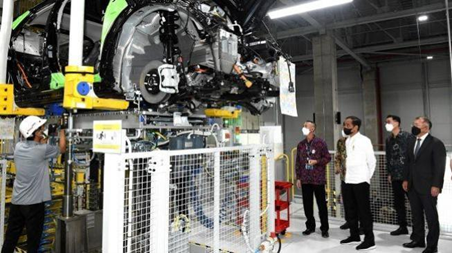
Joko Widodo launching an electric car plant last year. Picture: Antara
Indonesian President Joko Widodo is expected to visit Australia in early July amid increased efforts to make Australia both a commodity supplier and consumer end market for Indonesia’s ambition to develop an electric vehicle industry.
Car manufacturing featured in presentations for an Indonesian investment roadshow in eight Australian cities during May. Ambassador Siswo Pronomo told the Sydney event this week that the ASEAN summit plan for a regionwide electric vehicle ecosystem would underpin Indonesia's electric car ambitions.
The Widodo visit was discussed with Prime Minister Anthony Albanese at the G7, according to Indonesian foreign minister Retno Marsudi, and will mark the full resumption of an annual leaders’ meeting which was disrupted by the pandemic.
Indonesia has controversially banned exports of nickel and is close to doing the same with bauxite and cobalt that are also needed for EVs, in a strategy of luring foreign investment into domestic car manufacturing.
But it needs access to Australian lithium for batteries which sets up the potential for both collaboration and competition as the latest federal Budget provided funding for the development of a domestic Australian battery industry.
Meanwhile a number of other developments have underlined a rising tempo in bilateral business engagement:
Investment: The head of Indonesia’s sovereign wealth fund, Ridha Wirakusumah, said during a visit to Australia that superannuation funds were showing more interest in the country.
He told The Australian Financial Review: “Indonesia as a market has probably not been a focus of Australian super, partly perhaps because of a lack of knowledge and maybe perception issues. “But I think now they are starting to look at emerging markets, the fact that Indonesia has had a tremendously good record in terms of political stability and economic development, the prospect of a demographic dividend and the fact it is a close neighbour.”
Fertiliser: State-owned company Pupuk Kalimantan Timur has talked up more business with Australia after providing an emergency supply of urea to Australia in 2021 when this key ingredient of fertiliser and a diesel fuel additive was in short supply due to Ukraine war disruption.
Chief executive Rahmad Pribadi told The Australian he was planning to boost sales to Australia of fertiliser and diesel inputs from factories in West Papua. “Having better co-operation with Australia is very important not only for us in commercial terms but in more strategic views. Indonesia and Australia need each other,” he said noting the bilateral trade agreement had improved the landscape for trade.
Cattle exports: Australia’s three decade monopoly on live cattle exports to Indonesia seems set to come to an end with Brazil expected to get approval to export there in coming months. Indonesian takes half of Australia’s live cattle exports but high prices have prompted its food importers to look for alternative supplies. Australian producers say their quality reputation will main their competitiveness.
DIPLOMATICALLY SPEAKING
"I am pleased that President Biden is able to take up my invitation to address Parliament. I’m also looking forward to hosting the Quad leaders’ summit, which is the largest, most significant gathering in Australia since we hosted the G20 a decade ago."
- Prime Minister Anthony Albanese media release, (May 16 evening)
"The President spoke to Prime Minister Albanese earlier today to inform him that he will be postponing his trip to Australia. He also invited the Prime Minister for an official state visit at a time to be agreed."
- White House statement (May 17 morning AEST)
"These (debt) negotiations are scheduled to enter their critical and concluding phase during the last week of May. Regrettably, this conflicts with the President’s visits to Sydney and Canberra."
- Albanese (May 17 afternoon)
"I'm looking forward to our conversation today, and hosting you for an official state visit this year in Washington, DC. And again, I truly apologise to you for having to come here, rather than me being in Australia right now. But we have a thing going on at home right now and I’ve got to pay attention to that."
- Biden, (May 20 Hiroshima)
"I was saddened that you were unable to come down next week, but I understand the circumstances that you’re dealing with, and I would have done exactly the same thing. All politics is local, as you and I both understand. And I look forward to sometime in the future to your visit and you will always be the very welcome in Australia as you have in the past as Vice President."
- Albanese, (May 20, Hiroshima)
"All politics may be local, but friendship is permanent."
- Biden
DATAWATCH
AND THE WINNER IS...
Host countries typically do well at the Southeast Asian Games due to their right to choose the events, in another curious example of the ASEAN way. So, while Cambodia didn’t manage to beat its big neighbours like Viet Nam in the medal count this year, is still did noticeably well per capita.
The Philippines produced the best gold medal performance since 1987, Indonesia redeemed some football credibility after the Youth World Cup fiasco by winning the men’s gold for the first time since 1991 in a chaotic game against Thailand; and Malaysia is reeling from its worst ever gold tally.
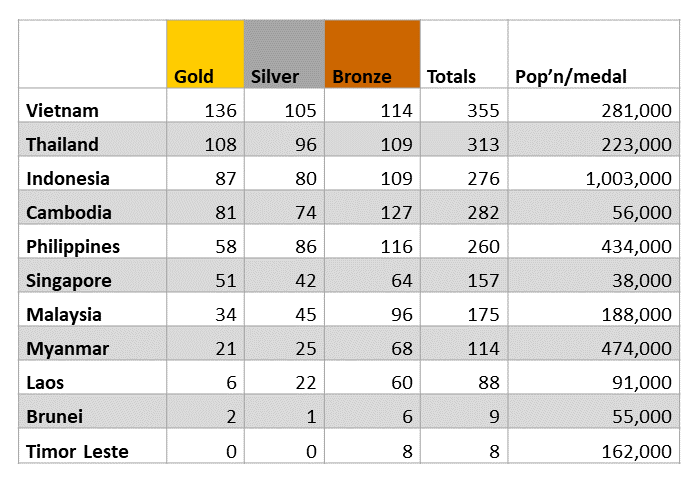
ON THE HORIZON
CRUNCHTIME IN CAMBODIA
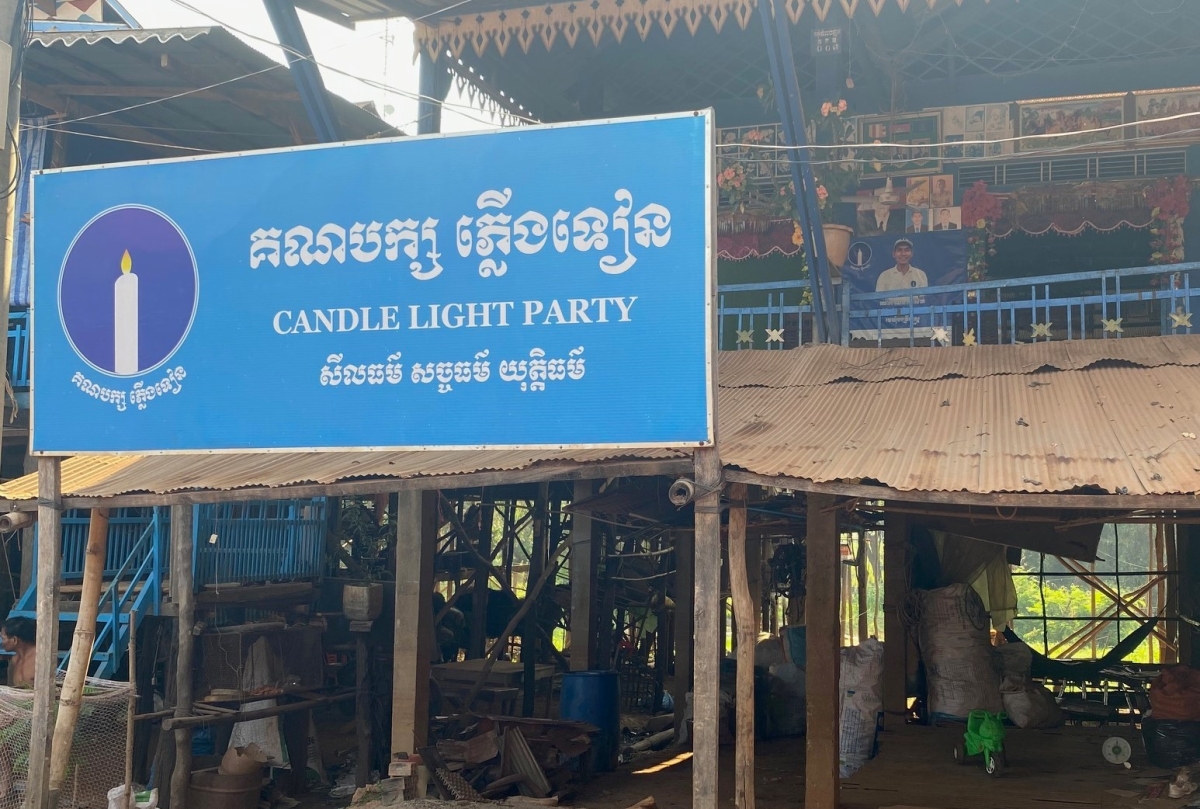
A Candle Light Party election poster outside Siem Reap before the ban. Picture: Greg Earl
Cambodian strongman Hun Sen has possibly hinted at uncertainty about whether he can successfully hand over power to his son Hun Manet at an election in July by extinguishing yet another opposition force in the country.
An election is due on July 23 to elect members of the National Assembly where Hun Sen's Cambodian Peoples Party holds all the seats after cracking down on the then opposition Cambodian National Rescue Party before the last election. This month the latest oppostion force the Candle Light Party has been banned from participating in the July election due to an obscure registration issue.
Hun Sen is widely expected to hand power to his son after the election and remain on in some titular postion such as head of the ruling party. There is an expectation that other members of Hun Sen's post Indochina wars generation of leaders will also make way for younger family members in a multi-dynastic transition.
But the concern about the country's youthful population potentially turning to the Candle Light Party suggests there are concerns about the competence, unity and popularity of new generation of planned leaders.
ABOUT BRIEFING MONTHLY
Briefing MONTHLY is a public update with news and original analysis on Asia and Australia-Asia relations. As Australia debates its future in Asia, and the Australian media footprint in Asia continues to shrink, it is an opportune time to offer Australians at the forefront of Australia’s engagement with Asia a professionally edited, succinct and authoritative curation of the most relevant content on Asia and Australia-Asia relations. Focused on business, geopolitics, education and culture, Briefing MONTHLY is distinctly Australian and internationalist, highlighting trends, deals, visits, stories and events in our region that matter.
Partner with us to help Briefing MONTHLY grow. For more information please contact [email protected].
